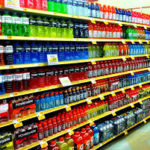Sports drinks are commonly used to aid athletic performance. But do these drinks have different effects on hydration? Work by Dr Kathryn Jackson and our dietetic students’ looks at recent research regarding choice of sports drinks on hydration of AFL footballers during pre-season training.
Hypohydration (or under hydration) is loss of body water as sweat, which usually occurs during prolonged exercise. The loss of body water occurs during under hydration has consequences for sport performance. Impact on endurance performance and cognitive function during exercise can be impaired in the presence of under hydration. In Australian Rules Football (AFL), maintaining high intensity aerobic performance for up to 2 hours of training or match play must be combined with quick decision making in high pressure situations, and can be severely impaired by under hydration. It has been argued that sports beverages with higher than usual sodium (concentrations might prevent hypohydration due to body water-retention properties of the extra sodium.
Dr Kathryn Jackson, Sports Dietitians at Flinders University and Jarrad Badock (Masters of Nutrition & Dietetics student) have recently carried out research to investigate the potential of sodium containing beverages on preventing under hydration with the help of senior and reserve team Australian Rules Football (ARF) players from West Adelaide Football Club. The aim was to measure the effects of two different sodium containing sports drinks on the hydration status of players during pre-season training. The effects of the sodium containing sports drinks were compared with the effects of cordial, a low sodium beverage usually provided at football training and fluid intake was fixed at 7mL/kg/hr for all players.
 Before and after training body weight and urine specific gravity were measured for each of the 10 players taking part in the study to assess hydration status. Players lost body weight as sweat during training sessions, regardless of sports beverage consumed, but there were no significant differences in effects between beverages. All losses of body remained below 2% of body weight, the level at which impairment of sports performance may occur.
Before and after training body weight and urine specific gravity were measured for each of the 10 players taking part in the study to assess hydration status. Players lost body weight as sweat during training sessions, regardless of sports beverage consumed, but there were no significant differences in effects between beverages. All losses of body remained below 2% of body weight, the level at which impairment of sports performance may occur.
Another surprising findings was that a third of the players samples (34.4%) arrived at training sessions already underhydrated, which may have skewed the results in a our sports beverage comparison study. The main findings of this study is that in temperate weather conditions cordial or standard sports drinks are just as good at providing adequate hydration as a high sodium oral rehydration solution. The focus should be on adequate volume of fluid consumption to prevent hypohydration, rather than the type of sports beverage consumed.
The following research summary was from a project conducted by Mr Jarrad Badcock, as part fulfilment of his Master of Nutrition and Dietetics degree. The project supervisor was Dr Kathryn Jackson. The research project was conducted at West Adelaide Football Club, using senior and reserve team Australian Rules Football (ARF) players.

